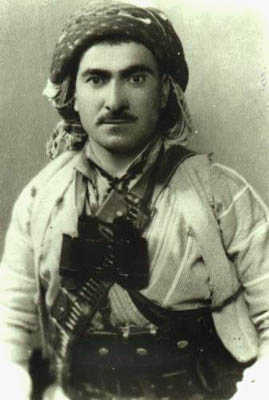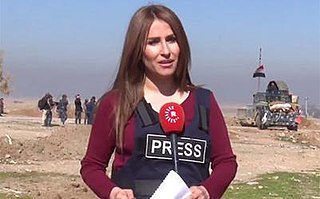
The Patriotic Union of Kurdistan is a political party active in Kurdistan Region and the disputed territories in Iraq. The PUK describes its goals as self-determination, human rights, democracy and peace for the Kurdish people of Kurdistan and Iraq. The PUK is currently under the leadership of Bafel Talabani. The PUK was founded in 1975 by Jalal Talabani, Nawshirwan Mustafa, Fuad Masum, Adel Murad, Ali Askari and Abdul Razaq Feyli. All presidents of Iraq under the 2005 constitution have been from this party.

Jalal Talabani was an Iraqi politician who served as the sixth president of Iraq from 2005 to 2014, as well as the president of the Governing Council of Iraq. He was ethnically Kurdish.

Sulaymaniyah or Slemani, is a city in the east of the Kurdistan Region of Iraq, not far from the Iran–Iraq border. It is surrounded by the Azmar (Ezmer), Goizha (Goyje) and Qaiwan (Qeywan) Mountains in the northeast, Baranan Mountain in the south and the Tasluja Hills in the west. The city has a semi-arid climate with very hot dry summers and cold wet winters.

Mustafa Barzani, also known as Mela Mustafa, was a Kurdish leader, general and one of the most prominent political figures in modern Kurdish politics.

Nechirvan Idris Barzani is a Kurdish politician serving as the second President of Kurdistan Region, Iraq. He was elected into office by the Kurdistan Region Parliament in June 2019. Nechirvan Barzani was appointed as Vice President of the Kurdistan Democratic Party since 2010. He previously served as Prime Minister of the Kurdistan Regional Government from March 2007 to August 2009 and March 2012 to May 2019. Nechirvan Barzani is also the founder of the University Of Kurdistan Hewlêr, the region's top ranking university located in Erbil. His rule combines aspects of Kurdish nationalism, national conservatism, economic liberalism, modernism and reforms, reforms in agriculture and women's rights.
Events in the year 2005 in Iraq.

Leyla Qasim was a Feyli Kurdish activist against the Iraqi Ba'ath regime who was executed in Baghdad. She is known as a national martyr among the Kurds.

Kajal Ahmad is a contemporary Kurdish poet and journalist, known for the show Dijebaw on Kurdsat. She started writing poetry in 1987.

Kurdistan Region is an autonomous administrative entity within the Republic of Iraq. It comprises four Kurdish-majority divisions of Arab-majority Iraq: the Erbil Governorate, the Sulaymaniyah Governorate, the Duhok Governorate, and Halabja Governorate. The KRI is bordered by Iran to the east, by Turkey to the north, and by Syria to the west. It does not govern all of Iraqi Kurdistan, and lays claim to the disputed territories of northern Iraq; these territories have a predominantly non-Arab population and were subject to the Ba'athist Arabization campaigns throughout the late 20th century. Though the KRI's autonomy was realized in 1992, one year after Iraq's defeat in the Gulf War, these northern territories remain contested between the Kurdistan Regional Government and the Government of Iraq to the present day. In light of the dispute, the KRI's constitution declares the city of Kirkuk as the capital of Iraqi Kurdistan. However, the KRI does not control Kirkuk, and the Kurdistan Region Parliament is based in Erbil. In 2014, when the Syria-based Islamic State began their Northern Iraq offensive and invaded the country, the Iraqi Armed Forces retreated from most of the disputed territories. The KRI's Peshmerga then entered and took control of them for the duration of the War in Iraq (2013–2017). In October 2017, following the defeat of the Islamic State, the Iraqi Armed Forces attacked the Peshmerga and reasserted control over the disputed territories.

Ibrahim Ahmad was a Kurdish writer, novelist, judge and translator who founded the Patriotic Union of Kurdistan in 1975. He is the father-in-law of Jalal Talabani and Abdul Latif Rashid through both of his daughters.
Events in the year 2007 in Iraq.

Ahmed Uthman Effendi also known as Ahmed Effendi, was a Kurdish politician from Erbil who played an important role in shaping events and the direction of public administration in Iraqi Kurdistan in the first half of the twentieth century.
The mass media in Iraq includes print, radio, television, and online services. Iraq became the first Arab country to broadcast from a TV station, in 1954. As of 2020, more than 100 radio stations and 150 television stations were broadcasting to Iraq in Arabic, English, Kurdish, Turkmen, and Neo-Aramaic.

The Kurdistan Democratic Party, usually abbreviated as KDP or PDK, is the largest party in Iraqi Kurdistan and the senior partner in the Kurdistan Regional Government. It was founded in 1946 in Mahabad in Iranian Kurdistan. The party states that it combines "democratic values and social justice to form a system whereby everyone in Kurdistan can live on an equal basis with great emphasis given to rights of individuals and freedom of expression."

The Iraqi–Kurdish conflict consists of a series of wars, rebellions and disputes by the Kurds against the central authority of Iraq starting in the 20th century shortly after the defeat of the Ottoman Empire in World War I. Some put the marking point of the conflict beginning to the attempt by Mahmud Barzanji to establish an independent Kingdom of Kurdistan, while others relate to the conflict as only the post-1961 insurrection by the Barzanis. Since the US-led invasion of Iraq and the subsequent adoption of federalism and the recognition of the Kurdistan Region (KRI) as a federal entity in the new Iraqi constitution, the number and scope of armed clashes between the central government of Iraq and the Kurds have significantly decreased. In spite of that, however, there are still outstanding issues that continue to cause strife such as the disputed territories of northern Iraq and rights to export oil and gas, leading to occasional disputes and armed clashes. In September 2023, following a series of punitive measures by the central government in Iraq against KRI, Masrour Barzani sent a letter to the President of the United States expressing concerns about a possible collapse of the Kurdistan Region, and calling for the United States to intervene.
The status of women in Iraq at the beginning of the 21st century is affected by many factors: wars, sectarian religious debates concerning Islamic law and Iraq's Constitution, cultural traditions, and modern secularism. Hundreds of thousands of Iraqi women are widowed as a result of a series of wars and internal conflicts. Women's rights organizations struggle against harassment and intimidation, while they work to promote improvements to women's status in the law, in education, the workplace, and many other spheres of Iraqi life, and to curtail abusive practices such as honor killings and forced marriages.

Ahmed Barzani revolt refers to the first of the major Barzani revolts and the third Kurdish nationalistic insurrection in modern Iraq. The revolt began in 1931, after Ahmed Barzani, one of the most prominent Kurdish leaders in southern Kurdistan, succeeded in unifying a number of other Kurdish tribes. The ambitious Kurdish leader enlisted a number of Kurdish leaders into the revolt, including his young brother Mustafa Barzani, who became one of the most notorious commanders during this revolt. The Barzani forces were eventually overpowered by the Iraqi Army with British support, forcing the leaders of Barzan to go underground.

Shifa Zikri Ibrahim, also known by her pseudonym Shifa Zirki Gardi, an Iraqi-Kurdish television presenter and journalist who was working for Rudaw Media Network in western Mosul, Iraq, was killed by a roadside bomb while reporting during the Iraq War.
Nuxsha Nasih Ahmed is the Mayor of Halabja in Iraqi Kurdistan. She is the second woman to be appointed to the most prominent political office in Halabja.
Shanaz Ibrahim Ahmed is a Kurdish Iraqi politician, writer, member of the Patriotic Union of Kurdistan, and current first lady of Iraq. Her husband is President Abdul Latif Rashid. She speaks Kurdish, Arabic, Persian and English, she is a daughter of the Kurdish writer, novelist and politician Ibrahim Ahmed, and a sister of former first lady of Iraq, Hero Ibrahim Ahmed.













